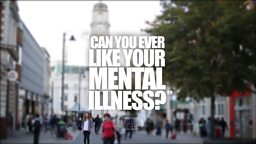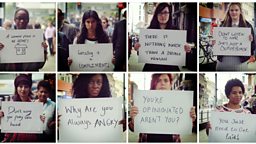Tuesday 21st October: South London

Rebecca's story: What happens when people learn you’ve self-harmed
Rebecca shares her experience of self-harm and the shocking reactions to her illness.
There has been a lot of coverage recently about the stigma attached to mental health problems but when the Free Speech team spoke to Rebecca we were shocked. ‘Stigma’ didn’t quite seem to cover it.
Our society and culture is often hostile to mental health. Films, media and popular culture are full of preconceptions and prejudice when it comes to ‘madness’. We equate mental health with ‘murderous psychopath’.
This is why Free Speech decided to make this programme.
We are recording the show in a mental health hospital in London and have invited an audience made up solely of those with a personal experience of a mental health issue. As the Mental Health Foundation write on their website; "Research shows that the best way to challenge these stereotypes is through first hand contact with people with experience of mental health problems." We hope to provide those watching the chance to have some 'first hand contact' and have a frank and open discussion about what it’s like to live with a mental health problem.
Self-harm
Rebecca’s story of prejudice is about the reaction of people to her self-harming, though self-harming is not in fact a mental illness. As the NHS website explains; “It is a way of coping with or expressing overwhelming emotional distress”, usually caused by something else – in Rebecca’s case, depression.
The issue of self-harm is really important but it’s also a difficult area. On the one hand, it’s a big story for our generation and important to talk about. As reported by the NHS website, a survey of people aged 15-16 years carried out in the UK in 2002 estimated that more than 10% of girls and more than 3% of boys had self-harmed in the previous year.
However, the media tends to glamorise the issue – focusing on the details, pictures of scars and descriptions used. We haven’t done this in Rebecca's film. Partly the reason for this is we want to avoid ‘triggering’ those who are trying to recover; just as describing a heroin hit might distress a drug addict trying to recover, explicit description can be unhelpful. However, the main reason is we wanted to focus on the hostile reaction of the teachers, school friends and others that Rebecca encountered – rather than on unnecessary details.
Is it okay to like my mental health issue?
A number of celebrities have spoken recently about liking their mental health problem or illness. In 2006, Stephen Fry, who has struggled with bipolar disorder, said; “I love my condition… I get a huge buzz out of the manic side. I rely on it to give my life a sense of adventure and I think most of the good about me has developed as a result of my mood swings”. Earlier this year, actor Robert Pattinson said; “I kind of like my anxiety in a funny sort of way and I like my peaks and troughs”.
On the other hand with prejudice in the work place, bullying and the gruelling experience of some conditions such as depression, are positive feelings like this only possible if you’re a rich celebrity?
This is one of the things we’ll discuss on Tuesday 21st October.
Remember you can tweet us @BBCFreeSpeech or comment on our Facebook page. Social media presenter Tina Daheley will try and get your comments heard in the debate.

On the panel is Tony Blair’s fomer Director of Communications, Alastair Campbell; Dr Sarah Wollaston MP, who has spoken about her experience with post-natal depression and is the chair of the Health Select Committee; journalist Jon Ronson, author of The Psychopath Test; and Zoe Hardman, a TV and radio presenter who has been open about her former battle with an eating disorder.




